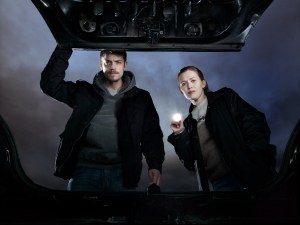
AMC
The Killing, which debuts Sunday night on AMC, is one of those murder stories in which the only things possibly as sad as the death it documents are the lives that survive it.
Yes, the title crime—the gruesome murder of Seattle teenager Rosie Larsen—is heartbreaking. But then there is the family she leaves behind, including two working-class parents who clearly pressed themselves to the limit trying to keep their family afloat and a young daughter under control, only to see everything shatter. There are her amoral, rudderless classmates, some seeming to bear guilt, if not for the murder, then for other things they don’t want known. There are the city politicians who see Rosie’s death as a talking point. And there is the investigator, Sarah Linden (Mireille Enos), a single mom who was hours away from moving out of town, burned out on homicide work, before this case draws her back in.
The Killing is based on the Danish series Forbrydelsen, which covered a single murder investigation, one day at a time, for a 20-episode season. The Killing aims to do the same over 13 episodes. Which means that—apart from deft writing by creator Veena Sud and some fine performances—one advantage it has is time. We usually divide dramas into “procedurals” (those, like CSI, that solve single cases in an hour) and “serials” (those that tell arcing stories over a season or more). The Killing is a serial procedural, which mans that not only can it patiently go through the process of building a case, turning over rocks and chasing false leads, it can also deeply probe the effects of the murder on those left behind.
One thing The Killing uses its gift of time for is setting mood, which, unlike the go-to mode of many cop shows, is not so much “dark” or “gritty” as melancholy. Taking advantage of its Northwest setting (it was actually shot in Vancouver) it seem to use the constant local rain—falling or just fallen, glistening on the street and dampening the dirt—as a co-star.
And Enos, who gave one of the best of a slew of great performances on Big Love (as a pair of polygamist twin sisters), was a fantastic choice for Sarah in this role. She has a quiet strength, and an ability to convey emotional turmoil through placidity. Her Sarah is, in a TV world of eccentric detectives, shockingly normal. She’s a single mom. She goes jogging. She has a son who’s been acting out at the thought of moving. She wears thick chunky sweaters—she could as easily be a proofreader as a crime-scene investigator.
But Linden brings to her work a quiet intensity that seems to be about more than public service, one that, to look at her tired eyes, has worn on her. When she catches her last case—when she has a flight scheduled that night to move to Sonoma Valley with her boyfriend and son—her departure date keeps getting pushed off. And the harrowing investigation, in that steady rain, contrasted with the idea of sunny Sonoma, becomes a metaphor for the difficulty of really changing her life.
That investigation breaks down into three parallel stories. First: the crime itself. Rosie turns up missing—the first hour is devoted to finding her body—and Linden begins asking questions around Rosie’s school, working with Stephen Holder (a perfectly skeevy Joel Kinnaman), the former narcotics cop who is supposed to replace her. Holder is cynical, tactless and given to questionable interrogation methods (like plying kids with fake weed to get them to talk). But while he has plenty to learn from Linden, his methods turn out to be not unsuited to the fishy, drug- and sex-saturated subculture of Rosie’s high school.
Second, there’s a political subplot, because the car Rosie’s body is found in turns out to have been stolen (or “stolen”?) from the campaign of mayoral candidate Darren Richmond (Billy Campbell). A widower and political idealist, Richmond is principled—or seems so—but his instincts to help the investigation soon conflict with the best interests of his campaign, especially when the cops ask him to withhold news in the early hours of the case.
Finally, and maybe most powerfully, there is the Larsen family. Rosie’s dad Stanley (Brent Sexton) is the owner of a small moving company, already overwhelmed by the normal terrors of raising a teen daughter, then forced to keep things together for his young sons. And as Rosie’s mother Mitch, Michelle Forbes is fantastic: tough but brittle, she’s fiercely dedicated to her family, but in a way that implies what trying to give her kids a better life has cost her.
Two working-class parents, a girl who may have mixed in with a bad crowd (or not) and disappears: it’s a not-unfamiliar setup, and many cop shows would give you a few seconds of anguish with them. In the excruciating but excellent scene in which they learn of Rosie’s death—I don’t want to spoil it with details—The Killing shows you their pain… and then stays with it. And stays with the anger, the numbness, the frustration, the self-punishment that follow.
The Killing itself is a slow burn, or rather drizzle. Three episodes in, I can tell you that I’m drawn in by the characters and eager to see a fourth; I can’t guess whether the story is finally going to be satisfying, and the show is deliberate and sparing in parceling out details on the case.
But it’s so far moving and captivating. Though the milieu is a little different, and the narrative style very different, there’s something in The Killing that reminds me of The Lovely Bones: a murder story that’s less about the killing than about the fact that a murder is a crime that does not end when the victim stops breathing.


